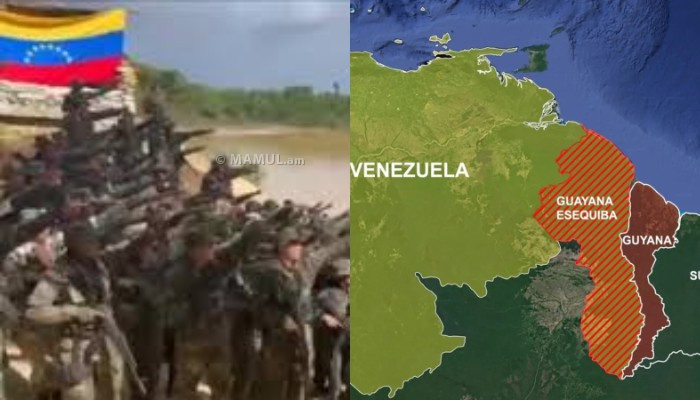Venezuela vows 'forceful' response if oil drilling begins in disputed zone Read more at: https://energy.economictimes.indiatimes.com/news/oil-and-gas/venezuela-vows-forceful-response-if-oil-drilling-begins-in-disputed-zone/107545626
 4606 Friday, 09 February, 2024, 21:00 Venezuela has vowed a "forceful response" if oil drilling begins in the disputed waters controlled by neighboring Guyana, as announced by US oil company ExxonMobil this week. Venezuelan Defense Minister Vladimir Padrino wrote on X that while ExxonMobil may have the protection of the United States and Guyana, "in the maritime space that rightfully belongs to Venezuela, they will receive a proportional, forceful response that adheres to the law." The disputed region has been controlled by Guyana, but Venezuela also claims sovereignty over it which comprises some two-thirds of Guyanese territory. On Wednesday, Venezuela's Vice President Delcy Rodriguez accused ExxonMobil of seeking "to protect its illicit operations in a sea which is pending delimitation, under the war-mongering mantle of the United States in complicity with Guyana." The 160,000 square km territory around the Esequibo River has found significance in recent years, after the discovery of offshore oil and gas by ExxonMobil. The maritime border between the two countries is also in dispute. ExxonMobil announced Tuesday that it plans to drill two exploratory wells this year off the coast of Essequibo. In December, Venezuelan President Nicolas Maduro called a referendum in Venezuela where voters overwhelmingly supported their country's claim to the oil-rich Essequibo region. Caracas claims the Essequibo River to the region's east forms a natural border recognized as far back as 1777. Tensions inflamed in the South American region when Britain sent a warship to the area, prompting Maduro to mobilize 5,600 troops in military exercises near the border. However relative calm prevailed after a meeting between the countries' foreign ministers in Brazil in January, following earlier face-to-face talks between Maduro and Guyana President Irfaan Ali, who agreed not to resort to force. The border dispute is currently before the International Criminal Court (ICJ) in The Hague. |

«A landmark moment for our nations’ partnership»: The White House
382Yesterday, 19:04
Trump wants new, improved nuclear arms treaty as New START expires
144406.02.2026, 00:00
The Government of Armenia is working with WHO to organize the treatment of dozens of children from Gaza in the hospitals of Armenia
162302.02.2026, 11:39
Rubio says territorial issue over Donetsk yet to be bridged between Russia, Ukraine
427828.01.2026, 23:00
The Assembly regrets the excessive polarisation and stigmatisation of political opponents by all sides in Armenia
442026.01.2026, 21:12
Ararat Mirzoyan will be on a working visit to Strasbourg
382526.01.2026, 12:08
The Moldovan Foreign Ministry announced the country's withdrawal from the CIS after the denunciation of key agreements.
578919.01.2026, 22:26
Regarding the Simplification of Visa Procedure for diplomatic, special and service Passport Holders between Armenia and Türkiye
1201329.12.2025, 18:42
